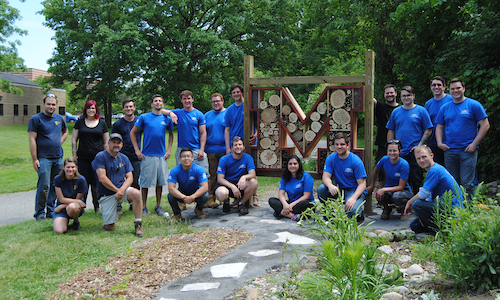In this UM-Dearborn creation—shaped like the Block M—many claim to be the home team: beetles, solitary bees, centipedes, thread-waist wasps, pill bugs, millipedes and more.
Seen along the Rouge River Gateway Trail in the Pollinator Garden, the Environmental Interpretive Center (EIC) led the construction of this “insect hotel,” a human-made structure created from natural materials intended to provide shelter and nesting sites for beneficial garden insects and invertebrates. Materials include logs, bark, dried sticks, bamboo, spruce and pine cones.
EIC Director David Susko said it’s fascinating to watch so many different “interesting creatures” co-exist together—but it’s also important to provide a safe, dry place for them to make a home.
“Our mission is to promote environmental education and sustainability in our community. When researching low-tech, environmentally friendly ways to help pollinators, I discovered myriad insect hotels of various sizes, shapes, and materials,” Susko said. “The novelty of our particular version was to make one in the shape of our Block M. We wanted it to serve an important purpose for wildlife and to be aesthetically pleasing for visitors passing through campus.”
The project was especially important since it is focused on pollinator insects, some of which were recently added to the U.S. Endangered Species List.
A 2016 U.N.-sponsored report found that about 40 percent of insect and invertebrate pollinator species—including bees—are facing extinction. This could have major implications for world food supply because about 75 percent of the world’s food crops depend on some form of pollination.
Knowing the native perennial plants in the pollinator garden and the bugs and invertebrates beneficial to it, the EIC team researched preferred “homes” to incorporate into the design. For example, holes of specific known dimensions were drilled in the logs to provide locations for organisms like leaf-cutter and mason bees to make chambers where their eggs could be laid and provisioned with food so that they could safely grow into larvae and, ultimately, adults.
“Pollinators perform an ecosystem service function for all of us, meaning that they pollinate many plant species, including many commercially important crops like apples, almonds, squashes and watermelons—services that would cost us a fortune to replace. One way to foster their presence is to recreate missing habitats for nesting, resting and hiding for wildlife—basically a safe space.”
Susko said the idea was in the works for a few years. Building Manager Mike Perrin drew up the design.
But they were waiting for the right time to build. That moment came this summer when Susko received a $4,000 grant and a volunteer workforce from Ford Motor Co. to support the project.
Along with EIC staff and students, 15 Ford employees—almost all of whom were UM-Dearborn graduates—gathered on campus to assemble and build the 10-by-6-foot structure as part of Ford’s community service-focused Accelerated Action Day.
“It’s important to build and plant in sustainable ways. Protecting our natural resources is a critical part of creating a better world,” said Janet Lawson, director of Ford Volunteer Corps. “We were happy to be a part of UM-Dearborn’s project, along with taking part in nearly 50 other community projects during the day.”
Susko said the support was instrumental in bringing the insect hotel to life.
“We are grateful to Ford for assisting us in our core mission to educate the public,” he said. “What was really cool is that while we were building it, the volunteers asked a lot of questions about the project and we were able to provide education to the Ford volunteers about the environmental benefits of their work, too.”
Susko said the insect activity is slowing down with the cool weather moving in, but the human population keeps coming to check out the structure.
“It’s become quite an attraction. People are constantly taking selfies with it,” he said.
“It’s a nice addition to campus—for both environmental enthusiasts and Michigan fans.”




